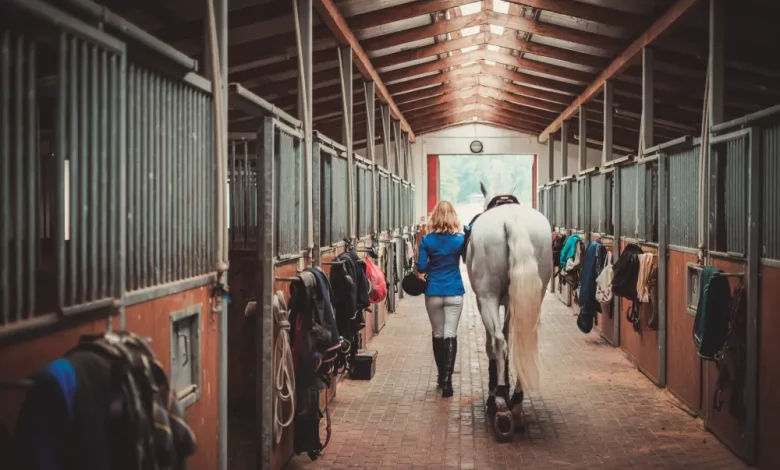Different Types of Horse Boarding Types, Costs FAQs

There are different types of horse boarding arrangements available.
Full Board
Full Care Board is a type of horse boarding that includes complete care for the horse. This typically includes feeding, watering, stall cleaning, turnouts, and other basic care. Full Care Board may also include additional services such as grooming, exercise, and veterinary care.
Full board may also include lessons, access to special riding areas such as an arena, and equipment use. There may be extra fees for specialized feeds or supplements, farrier and veterinarian calls and treatments, blanketing, or others. The boarding contract should outline all services provided and what will require extra payment.
Part-Board
Partial boarding is another option. In this situation, you share the use of your horse with another person in exchange for cheaper boarding costs. For example, if full board is $600/month, part-board may be $300/month but someone else gets to ride the horse three times a week. Depending on the contract agreements, another user may or may not bring his own equipment, etc. They also may or may not be responsible for care such as farierr and veterinarian services. All the details should be outlined in a contract.
For those who wish to offer their horse for part-board, expect to pay less for board, but give up time spent with the horse. Find someone who’s trustful and whose riding and handling skills are similar to your own.
Pasture Board
Pasture Boarding facilities may provide basic care such as feeding and watering, but horse owners are responsible for providing any additional care. This board allows horses to socialize and move around freely, which can have several benefits for their health and well-being. However, it’s important to research and choose a reputable Pasture Boarding facility with safe and secure fencing and access to clean water sources.
Self-Care Board
With self-care board, the facilities will be provided and the rest is up to the owner. The owner will have to bring in their own feed and bedding. Feeding, turn-out, and mucking our will be the owner’s responsibility. They will have to arrange for and be there when vets or farriers are needed. This situation can work well if a group of people can work together or for someone who lives very close to the stable. The downside is that, like having horses in the backyard, owners will have to make sure the horses are cared for every day.
Choosing The Right Horse Boarding
When choosing a boarding facility for your horse, weigh all of your options carefully. Consider the maximum distance you are willing to travel, what your budget is and how much time you could spend with your horse.
Ultimately, these are the main factors that will influence which stable and type of board you will choose.
What details are in a horse boarding agreement?
A boarding agreement is a legal contract you sign when committing to a boarding facility. It should clearly outline what’s included in your horse’s board and the rules you must follow while staying at the barn.
Horse Boarding Near Me
If you’re a horse owner, finding a reliable and convenient boarding facility is essential. To help you with your search, here are some tips for finding horse boarding near you:
- Ask for recommendations: Talk to other horse owners in your area and ask for recommendations on boarding facilities.
- Search online: Use search engines or online directories to find horse boarding facilities near you.
- Check social media: Look for local horse groups or associations on social media platforms like Facebook and Instagram.
- Visit facilities: Once you’ve found some potential facilities, schedule a visit to see the property and meet the staff.
- Consider your needs: Think about what you and your horse need in a boarding facility, such as type of boarding, amenities, and location.
By taking these steps, you can find a horse boarding facility that meets your needs and is conveniently located near you. Don’t forget to read reviews and ask for references before making a final decision.
Other Arrangements
In conclusion, there are horse boarding options that can fit different budgets, but it’s important to ensure they meet both your and your horse’s needs.
Whatever the boarding arrangement, the horse’s welfare is still the owner’s responsibility. Don’t assume that the horse can be ignored for long periods of time or that it is the stable owner’s problem if the horse becomes sick or needs special attention.




